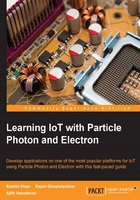
Hardware and software in the IoT ecosystem
Advancement in technology and affordability has made acquisition and usage of IoT devices very simple. However, in order to decide which IoT package (boards, accessories, sensors, and software) to choose for a particular application, and actually building projects, it is essential to have knowledge of IoT terminology, hardware, and software. In this section, we will introduce you to the essential terminology used when dealing with the IoT. This will also help you to understand and appreciate the features of the Particle IoT products—Core, Photon, and Electron—explained in detail later in the chapter.
Essential terminology
Let's learn about a few terms that we're going to be hearing all throughout this book, and whenever we work with IoT hardware and software components:

Table 1: Terminology
Network protocols
Connected smart devices need to communicate with each other and exchange large volumes of messages between themselves and the cloud. To ensure near real-time response, smart bandwidth usage, and energy savings on the resource-constrained IoT devices, new protocols have been added to the traditional seven-layer network model (OSI model:https://en.wikipedia.org/wiki/OSI_model). The following table shows the major OSI network protocols and the IoT network protocols suitable for various smart, connected devices.

Table 2: Layerwise Network Protocols - OSI versus IoT